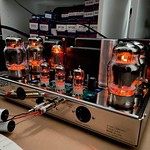 by gktamps Wed Feb 27, 2019 11:27 am
by gktamps Wed Feb 27, 2019 11:27 am
Schlangen presents a lot of graphic, illustrative information about the entire topic - triode, tetrode, pentode, variations on operation, load lines, and more - then concludes with examples of TV pentodes connected as triodes for audio applications.
VTA M125 "emasculation" occurs through connecting the screen grid to the plate through a 100R resistor as a grid stopper to eliminate oscillation, just as you indicated earlier.
I personally prefer the tone, response, and power of my M125s in pentode mode. I have built a couple of tube guitar amps with pentode/triode switches, but again, prefer the pentode tone, feel, and punch.
Returning to the OP's original reasons for posting, those tubes have seen a lot of use, so perhaps one or more failed from use. It would be good to check the grid stoppers to make sure one or more isn't open. I haven't found any readily available online references that state operating a pentode in triode mode puts more stress on the tube, but maybe Bob or Ray will chime in...
Last edited by gktamps on Fri Mar 01, 2019 10:51 am; edited 2 times in total




